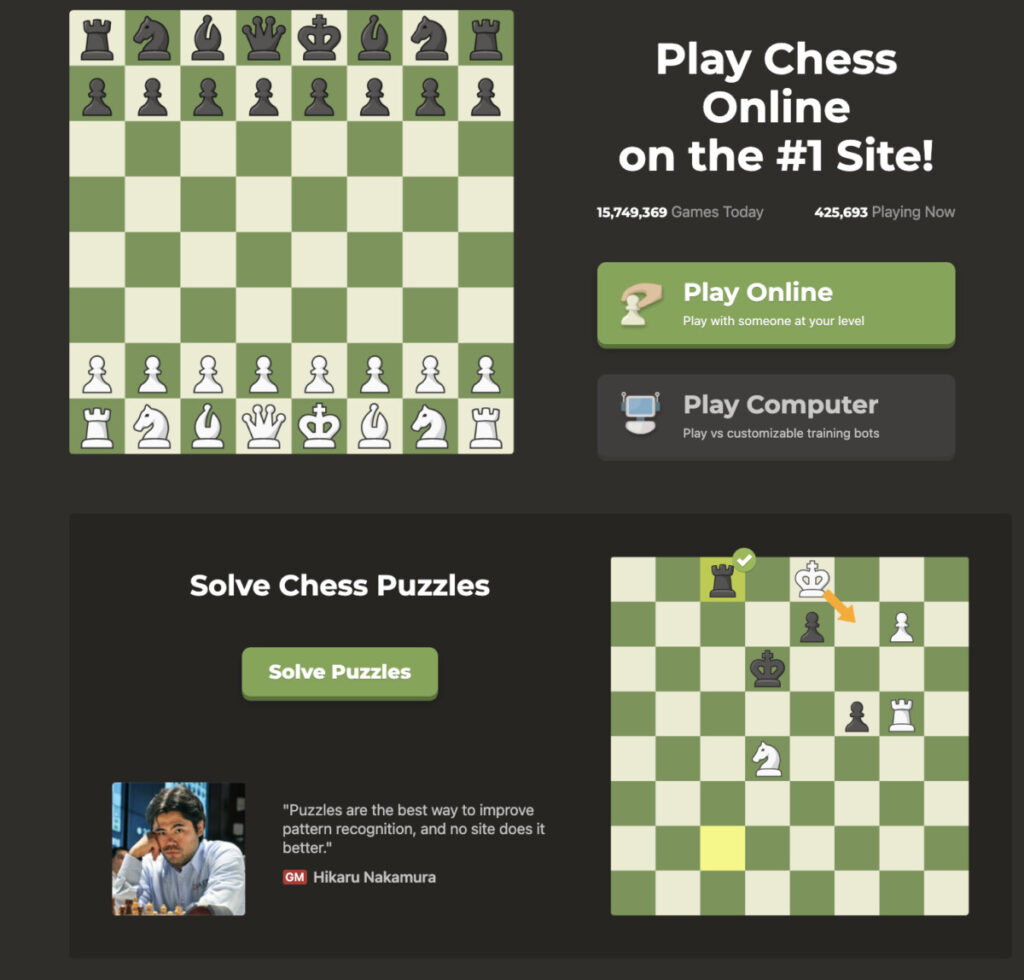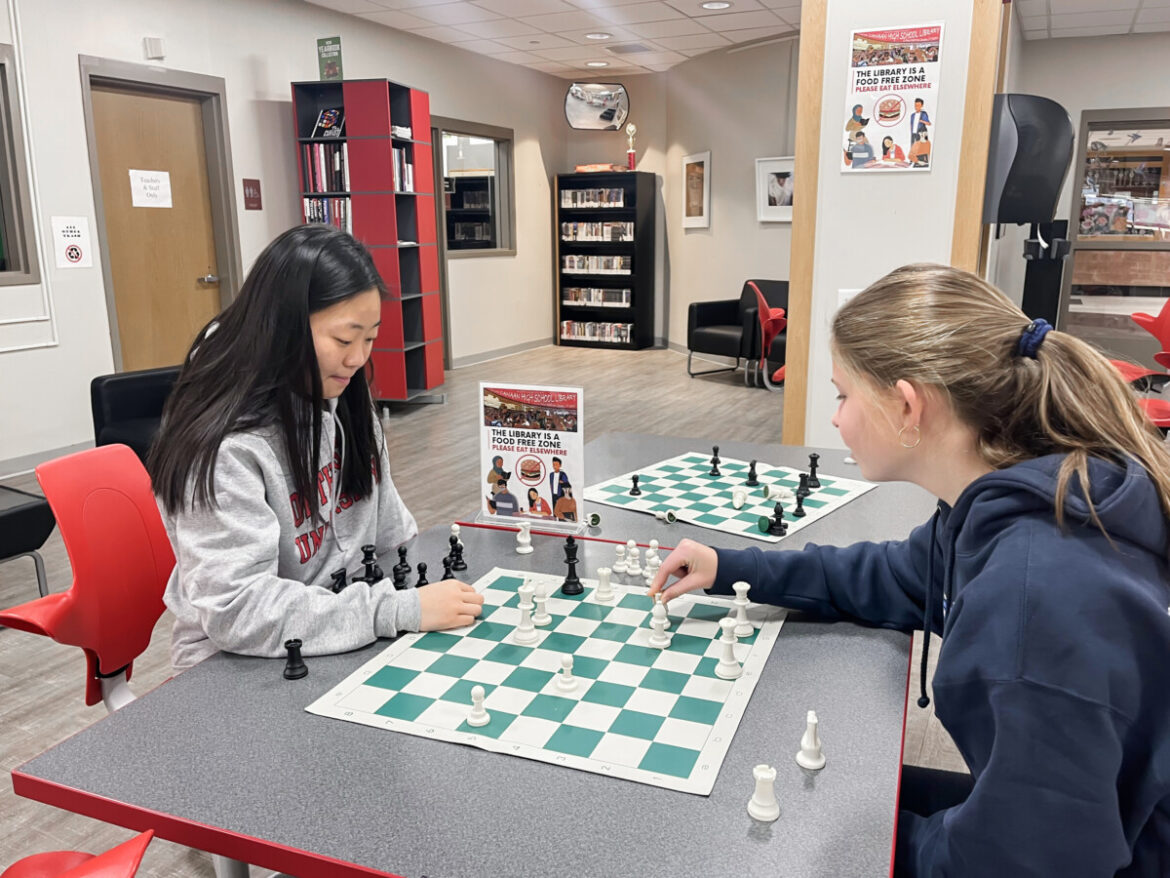Avery Cotton, News Editor
@averyccourant
Chess is one of the most complex board games that has ever been created. The possibilities are virtually endless, per mathematician Claude Shannon, with more possible games than atoms in the observable universe. Chess has become popular worldwide, with millions of players of all ages and skill levels participating in games and tournaments. The game has become a career for thousands of players who specialize in its wealth of theories and strategies, and it’s also turned into an outlet for many others since the dawn of the COVID pandemic.
With its capacity to develop cognitive skills, chess is undoubtedly an excellent option for students looking to learn a new skill or take an engaged break from academics. In the school’s mission to “create the conditions that encourage all of our students to excel”, it was only a matter of time before chess boards were installed in the library.
With the arrival of the midterms season in the most COVID-free year yet, librarians and administrators were keen to look for activities for students during breaks between exams. “I received a message from Mr. Sullivan about the kinds of things we did in exam week in the past, asking if we had any suggestions,” Library Department Chair Michelle Luhtala said. “We had all of these board games that were sitting in a closet, so we brainstormed ideas about the kinds of activities we could offer. We decided we’d put out the chess and game boards in the hope that when kids got up and went back to the rest of their day, they felt refreshed and reinvigorated.”
The chess boards were originally set up for student use during breaks. “The whole idea was to have a brain break area available during midterms,” Library Administrator Angela Wilson said. “Exam week is a highly stressful time of the year and we wanted to make sure that people had the ability to rest their eyes and brains a bit. We set up that general area for brain breaks and it was such a huge success that we decided to leave the games out.”
After COVID put a damper on many face-to-face activities, the installment of the chess boards has helped provide an interpersonal outlet for many students. “It’s been great so far, and one of the things that I love seeing is the kids literally just talking to each other without their devices,” Ms. Luhtala said. “During COVID, socialization was the one thing that was absolutely lost for younger people. Watching people interacting, having conversations, and working through problems face-to-face with their voices is really great to see.”
Chess National Master and senior Nate Moor approves of the chess boards and the environment they have created. “I think the chess boards are great,” Nate said. “They create a leisurely environment where many people can come out and play. I think it’s awesome and I’m really happy to see it.”
Nate believes that in-person chess boards are a much better entryway into the game than online chess. “ Playing solely online is unhealthy, and it doesn’t transition to over-the-board chess very well,” Nate said. “Getting play on the board is very important, as online chess is very psychologically different from live chess. The positions you get online are different and your play feels different, so I would suggest to beginners who play online a lot to play over-the-board tournaments, which will give them a stronger start to the game.”

Ms. Wilson agrees with Nate’s idea that over-the-board chess is significantly different from online chess. “Something is viscerally different when your opponent is across from you, and you have a lot to learn when you’re face to face with your opponent,” Ms. Wilson said. “It’s more of a social experience, with many more opportunities to learn about interacting with a person. Understanding an environment is super important for kids as they enter college and the workforce.”
Aside from the improvement in certain cognitive abilities, chess can be applied to a rich variety of interpersonal situations. “You might be in a board room when pitching an idea and have to sell it to a certain person,” Ms. Wilson said. “People have certain tells in their physical behavior and you learn that by playing chess, as well as how to read a room, and how to read a person that you’re selling a product to. Chess is a great resource, and I love the fact that we’re playing it because it’s fun but we also learn so much about human behavior.”
The live boards provide a host of other benefits. “With these live boards, you can meet new people and have a good time, and if you’re really competitive, you can use the boards to strengthen your over-the-board skills and even go to tournaments,” Nate said. “I would recommend doing this for beginners who are ambitious. There are a lot of people out there who just want to play chess for the sake of playing it, but why not have an ambition?
As for the mental benefits of the board game, chess sharpens the mind in many ways. “Chess is all about strategy, anticipation, and being able to think forward several steps from multiple perspectives, which are all critical skills,” Ms. Luhtala said. “At the district level, we focus on innovation and design, and chess really helps ingrain the set of dispositions that lend themselves to innovative thinking.”
And what does the master think? “I think learning chess is not only fun and social, but it also teaches you a lot of life skills,” Nate said. “Some of these skills include decision-making, perseverance, and being patient.”
Since its appearance, the chess boards in the library have become a social sensation as well as a fixture in the mix of activities that the library incorporates to foster innovation. “We’ve created new space over the last five years, with the biggest shift this past summer when we took out an office and opened up the Makerspace,” Ms. Luhtala said. “Chess seems to be a symbiotic complement with that in terms of trying to get people to think logically, creatively, and innovatively. Chess is literally a mind exercise that feeds into the kind of innovation that we’re trying to promote.”
Library Media Director Monica Sheehan agrees with the notion that chess is a good brain exercise. “Chess is an activity that involves higher-order thinking, problem solving, and more,” Ms. Sheehan said. “I believe that chess is a great activity for kids during their free time because it stimulates the mind.”
The presence of the boards is especially critical this year, which marks the first year in many without a formal chess club. “Since we don’t have the chess club this year, the chess boards are a great outlet for students who want to play chess,” Ms. Sheehan said. “The chess boards are taking on a life of their own, and I’ll even see students come down after school to play chess.”
The chess boards have managed to make the library space even more versatile. “The whole concept here is to walk away from the devices, and give yourselves a break from school and class,” Ms. Wilson said. “The fact that the kids are here utilizing every inch of the library instead of walking around and hanging out in the cafeteria is great, and since it’s such a success, it will definitely stay.”




